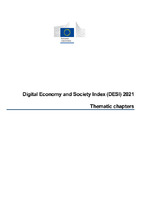| dc.description.abstract | Since 2014, the European Commission has been monitoring Member States’ digital progress through
the Digital Economy and Society Index (DESI) reports. Each year, DESI includes country profiles which
support Member States in identifying areas requiring priority action as well as thematic chapters
offering a European-level analysis across key digital areas, essential for underpinning policy
decisions.
The COVID-19 pandemic has had a significant impact on the EU’s economy and on EU society. It has
significantly changed the role and perception of digitalisation in our economies and societies, and
accelerated its pace. It has also shown the decisive role that disruptive innovation and technology
can play. As stated in the 2020 DESI reports, it has intensified the use of public and private online
services, putting pressure on the capacity of digital connectivity networks. The European
Commission has been coordinating a common two-pronged response to COVID-191. The first part of
its response is a health emergency response based on an EU Health Union, a vaccination strategy
and a common approach to making it safe to travel again. The second part of its response consists of
addressing the immediate and the long-term economic effects of the pandemic. Alongside Member
States’ short-term efforts to cushion their economies, the Commission has adjusted a number of EU
programmes to provide liquidity support for companies and adopted temporary State aid measures
allowing Member States to give severely affected companies further support. But to build a more
sustainable, resilient and fairer Europe for future generations, massive investments and structural
reforms will be needed in the medium to long term. To this end, the EU adopted a European
Recovery Plan in December 2020, the Next Generation EU. The package aims to support Member
States in their efforts to address the fallout from the pandemic, kick-start the EU economy and put it
on a greener, more digital and more resilient path. The centrepiece of the Next Generation EU is the
Recovery and Resilience Facility. |

